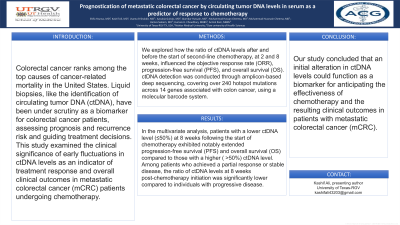Tuesday Poster Session
Category: Colon
P3634 - Prognostication of Metastatic Colorectal Cancer by Circulating Tumor DNA Levels in Serum as a Predictor of Response to Chemotherapy
Tuesday, October 29, 2024
10:30 AM - 4:00 PM ET
Location: Exhibit Hall E

Has Audio

Kashif Ali, MD
University of Texas Rio Grande Valley
Edinburg, TX
Presenting Author(s)
Award: Presidential Poster Award
Shifa Younus, MD1, Kashif Ali, MD2, Usama B. Shabbir, MD3, Azouba Gulraiz, MD4, Alamdar Hussain, MD5, Muhammad Hassan Cheema, MD5, Muhammad Hussnain Cheema, MD5, Hamza Saleem, MD5, Humais H. Choudhary, MBBS6, Anmol Rani, MBBS7
1Nishtar Medical University and Hospital, Multan, Punjab, Pakistan; 2University of Texas Rio Grande Valley, Edinburg, TX; 3Services Institute of Medical Sciences, Lahore, Punjab, Pakistan; 4Merit Health Wesley, Hattiesburg, MS; 5Nishtar Medical University, Multan, Punjab, Pakistan; 6Sahiwal Medical College, Sahiwal, Punjab, Pakistan; 7Dow University of Health Sciences, Karachi, Sindh, Pakistan
Introduction: Colorectal cancer ranks among the top causes of cancer-related mortality in the United States. Liquid biopsies, like the identification of circulating tumor DNA (ctDNA), have been under scrutiny as a biomarker for colorectal cancer patients, assessing prognosis and recurrence risk and guiding treatment decisions. This study examined the clinical significance of early fluctuations in ctDNA levels as an indicator of treatment response and overall clinical outcomes in metastatic colorectal cancer (mCRC) patients undergoing chemotherapy.
Methods: We explored how the ratio of ctDNA levels after and before the start of second-line chemotherapy, at 2 and 8 weeks, influenced the objective response rate (ORR), progression-free survival (PFS), and overall survival (OS). ctDNA detection was conducted through amplicon-based deep sequencing, covering over 240 hotspot mutations across 14 genes associated with colon cancer, using a molecular barcode system.
Results: In the multivariate analysis, patients with a lower ctDNA level (≤50%) at 8 weeks following the start of chemotherapy exhibited notably extended progression-free survival (PFS) and overall survival (OS) compared to those with a higher ( >50%) ctDNA level. Among patients who achieved a partial response or stable disease, the ratio of ctDNA levels at 8 weeks post-chemotherapy initiation was significantly lower compared to individuals with progressive disease.
Discussion: Our study concluded that an initial alteration in ctDNA levels could function as a biomarker for anticipating the effectiveness of chemotherapy and the resulting clinical outcomes in patients with metastatic colorectal cancer (mCRC).
Disclosures:
Shifa Younus, MD1, Kashif Ali, MD2, Usama B. Shabbir, MD3, Azouba Gulraiz, MD4, Alamdar Hussain, MD5, Muhammad Hassan Cheema, MD5, Muhammad Hussnain Cheema, MD5, Hamza Saleem, MD5, Humais H. Choudhary, MBBS6, Anmol Rani, MBBS7. P3634 - Prognostication of Metastatic Colorectal Cancer by Circulating Tumor DNA Levels in Serum as a Predictor of Response to Chemotherapy, ACG 2024 Annual Scientific Meeting Abstracts. Philadelphia, PA: American College of Gastroenterology.
Shifa Younus, MD1, Kashif Ali, MD2, Usama B. Shabbir, MD3, Azouba Gulraiz, MD4, Alamdar Hussain, MD5, Muhammad Hassan Cheema, MD5, Muhammad Hussnain Cheema, MD5, Hamza Saleem, MD5, Humais H. Choudhary, MBBS6, Anmol Rani, MBBS7
1Nishtar Medical University and Hospital, Multan, Punjab, Pakistan; 2University of Texas Rio Grande Valley, Edinburg, TX; 3Services Institute of Medical Sciences, Lahore, Punjab, Pakistan; 4Merit Health Wesley, Hattiesburg, MS; 5Nishtar Medical University, Multan, Punjab, Pakistan; 6Sahiwal Medical College, Sahiwal, Punjab, Pakistan; 7Dow University of Health Sciences, Karachi, Sindh, Pakistan
Introduction: Colorectal cancer ranks among the top causes of cancer-related mortality in the United States. Liquid biopsies, like the identification of circulating tumor DNA (ctDNA), have been under scrutiny as a biomarker for colorectal cancer patients, assessing prognosis and recurrence risk and guiding treatment decisions. This study examined the clinical significance of early fluctuations in ctDNA levels as an indicator of treatment response and overall clinical outcomes in metastatic colorectal cancer (mCRC) patients undergoing chemotherapy.
Methods: We explored how the ratio of ctDNA levels after and before the start of second-line chemotherapy, at 2 and 8 weeks, influenced the objective response rate (ORR), progression-free survival (PFS), and overall survival (OS). ctDNA detection was conducted through amplicon-based deep sequencing, covering over 240 hotspot mutations across 14 genes associated with colon cancer, using a molecular barcode system.
Results: In the multivariate analysis, patients with a lower ctDNA level (≤50%) at 8 weeks following the start of chemotherapy exhibited notably extended progression-free survival (PFS) and overall survival (OS) compared to those with a higher ( >50%) ctDNA level. Among patients who achieved a partial response or stable disease, the ratio of ctDNA levels at 8 weeks post-chemotherapy initiation was significantly lower compared to individuals with progressive disease.
Discussion: Our study concluded that an initial alteration in ctDNA levels could function as a biomarker for anticipating the effectiveness of chemotherapy and the resulting clinical outcomes in patients with metastatic colorectal cancer (mCRC).
Disclosures:
Shifa Younus indicated no relevant financial relationships.
Kashif Ali indicated no relevant financial relationships.
Usama Shabbir indicated no relevant financial relationships.
Azouba Gulraiz indicated no relevant financial relationships.
Alamdar Hussain indicated no relevant financial relationships.
Muhammad Hassan Cheema indicated no relevant financial relationships.
Muhammad Hussnain Cheema indicated no relevant financial relationships.
Hamza Saleem indicated no relevant financial relationships.
Humais Choudhary indicated no relevant financial relationships.
Anmol Rani indicated no relevant financial relationships.
Shifa Younus, MD1, Kashif Ali, MD2, Usama B. Shabbir, MD3, Azouba Gulraiz, MD4, Alamdar Hussain, MD5, Muhammad Hassan Cheema, MD5, Muhammad Hussnain Cheema, MD5, Hamza Saleem, MD5, Humais H. Choudhary, MBBS6, Anmol Rani, MBBS7. P3634 - Prognostication of Metastatic Colorectal Cancer by Circulating Tumor DNA Levels in Serum as a Predictor of Response to Chemotherapy, ACG 2024 Annual Scientific Meeting Abstracts. Philadelphia, PA: American College of Gastroenterology.

